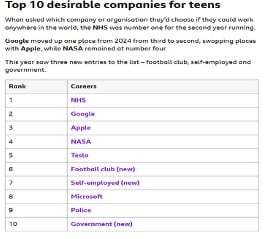Engineering Dreams or Reality? What Teens Want vs. What Engineers Do

A recent BBC article based upon the results of the Bitesize Careers survey (2025) of four thousand and one (???) 13- to 16-year-olds listed “Engineering” as the second most desirable job teenagers want behind being a Doctor.
It is curious, but not surprising that the BBC states the survey is “of more than 4000” when the actual number listed as being surveyed was actually 4001.
It would be interesting to hear from the BBC as to specifically why they choose the actual number of 4001 teenagers to survey and not 4000 (exactly), or a number “of more than” that was significantly higher than just one sole individual above 4000 number? Curious and seemingly odd from the BBC… and not for the first time. BBC Link: Survey reveal: What are the top 10 jobs teens want? – BBC Bitesize
Apart from the rather odd 4001 number of people surveyed, the “Top 10 desirable companies to work for” survey listed were Google, Apple, NASA, Tesla, and Microsoft as 5 of those 10. Self-employed, NHS, NASA, Police and Government make this “top-10” list, but aren’t “companies” as such. I wonder what sorts of “Engineers” those surveyed “desire” to be at such companies?
The article makes no reference as to what sorts of Engineering the survey respondents were referring to, nor whether any of the 4001 respondents had much of an idea who Engineers are or, what they actually do in their day job.
The next obvious question to these same respondents should have been to comment as to what they expected to be doing in such roles. It would be curious to hear what 13- to 16-year-olds think “engineers” do, and how that delivers upon their “desirability” (further in the BBC article) criteria of:
- “Feel good about what you do” (28%),
- “Happiness” (26%),
- “Money” (18%), and
- “Feel like you’re helping people” (18%).
It would also be curious to determine from Google, Apple, NASA, Tesla, and Microsoft as to how many (and which disciplines) graduate engineers they employ and what engineering they do. I’d also refer 13- to 16-year-olds to the quote attributed to Helen Gurley Brown:
“Money, if it does not bring you happiness, will at least help you be miserable in comfort.”
More curious then is the finding of the survey that the majority (57%) of young people surveyed said they would not be willing to pursue a job that they did not enjoy even if it was well paid.
Let’s hope that by the time these 13- to 16-year-olds are ready to make those important career decisions that they come to realise that many things in life are about compromise.


Whilst it isn’t surprising to see “money” and “happiness” high up the list of what 13- to 16-year-olds think is desirable, I would expect that many 40+ year old career engineers would find those things are often mutually exclusive.
A career that pays well, often does so for a reason. I have no work association, nor knowledge of working for 9 of the 10 “top” desirable companies. What many of us do have experience with is the 7th most desirable “company” in being self-employed. I’d have the following quote to offer these budding 13- to 16-year-olds career professionals:
“The worst thing about being self-employed is your boss!” – Anon.
Things may have (probably have) changed since I graduated from university in the early 1990s, however, of the people I know among those fellow Chemical Engineers graduates, few entered “core Process engineering”; and of those who did, few remained in Engineering all that long.
It is a moot point here as to what constitutes “core” engineering, and what doesn’t. Given the breadth of what Chemical Engineers do, and that many of us end up classified as “Process Engineers”; I would struggle to provide a concise definition of “a Chemical Engineer” even after 30+ years in industry.
I could describe what I have done, and what am I doing, however that’s likely to be different from another Chemical Engineering graduate if asked the same question.
I can’t speak for other engineering disciplines, and 9 of those “top 10 desirable companies listed” (other than being self-employed), and that few of them would seem to employ graduate engineers within “core Engineering” roles (depending upon how or what one defines as being an “core Engineering role”).
Of those whom I personally know as having transitioned from working for an engineering service provider or operator doing engineering projects, to those 9 companies as mentioned in this “top ten”, most have moved into management or product support/sales roles that could be defined as “non-Engineering” roles (of these people I know personally as having made this transition).
Most of these same people I have since spoken to have told me that they are happier in their latter role than their former employment. Perhaps the BBC would better serve the TV licence paying public by addressing that question rather than in running an ill-defined survey to an uninformed respondent sample?
The elephant in the room here would also be to ask those currently long serving in Engineering, given an opportunity to do so, would the same career path or undergraduate degree be chosen again?
As an industry, and as a profession, I would believe that those last points are a strong indicator that we still have some ways to go in providing inclusion and equality in the workplace. As to how “desirable” engineering is, or has been….
That’s a very open-ended question that would be hard for me to provide an answer to given “what engineers do” is broad; as is where engineers work. I don’t regret undertaking an engineering degree; however, I can’t say with certainty that I’d do so again given the chance to step back in time with hindsight.















